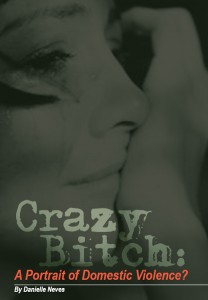Why I Write about Violence Against Women
As part of Domestic Violence Awareness Month, we are featuring blog posts by women writers on the topic.
“Just as the body goes into shock after a physical trauma,
so does the human psyche go into shock after the impact of a major loss.”
Anne Grant
As a domestic violence advocate, I find myself changed by the stories. Trauma is like that. So I sometimes find the term “domestic violence” a little too sterile to describe the unrelenting horror that women and children endure every day.
As someone who has worked on the front-lines, it is galling to observe societal apathy to domestic violence. After all, it is not as if we do not know the extent of the problem and its consequences. Certainly, the World Health Organization has documented both the prevalence and the health burden of domestic violence worldwide (see, for example Garcia-Moreno et. al 2005). Earlier this year, TRAP, The Real Art of Protest, used FBI statistics to compare the casualties of the war on terror to the number of women killed by intimate partners (see link below).
However, I would hazard a guess that international military spending far exceeds the financial resources expended on preventing and battling domestic violence. Furthermore, whilst there are commonly understood idioms for expressing our outrage at terrorism or drug trafficking, for example (i.e. “the war on terror,” “the war on drugs”), there is no comparable language to articulate the atrocities of domestic violence. There is no war on domestic violence. Instead, we have campaigns.
When I set out to write Crazy Bitch: A Portrait of Domestic Violence?, I reflected on why this was so. Perhaps, in a society immunised to domestic violence, the WHO statistics are just numbers… Perhaps, these numbers lack the vivid imagery associated with other social justice issues. Perhaps the bruised eye of an individual woman (now iconic in conveying the terrorism that occurs behind closed doors) lacks the resonance of other images associated with terrorism.
Perhaps, my experiences of “domestic violence” are different to the everyday. For me, those two words evoke memories that fall outside common human experience.
Indeed, the words “domestic violence” remind me of rummaging for clothes in my wardrobe in the aftermath of a desperate two a.m. call from a woman standing in freezing cold temperatures on the street in her pajamas. She had been locked out of her house by her partner and needed somewhere to sleep. I cannot hear the words “domestic violence” without remembering all those women I have worked with, just as I have internalized the memory of each hoarse syllable I listened to, as one of my clients sat with me for an hour. Listening to her trying to make sense of why her abusive partner had been released from police custody after violently assaulting her, I bit back tears and struggled to maintain professional composure. He had killed himself and their two children a few hours after being released from custody.
In writing Crazy Bitch, I set out to immerse the reader in some of these memories. I do not apologize for the fact that my writing is shocking and sometimes difficult to read. If I wanted to write a best-seller, I guess I could have glorified the violence a little more… I chose to use the perpetrator as my main protagonist to highlight his lack of remorse, his belief in his inalienable right to abuse his partner because such beliefs do enable the violence to keep on happening. Whilst it would be reassuring to think of this protagonist’s sexism and need for power and control as unique, they are not. They conspire with many patriarchal norms to facilitate the violence that women and children experience every day. More significantly, in my novel, I have documented sixteen predictable real-life domestic homicides that occurred during the course of the events my characters describe. My point is not all that subtle. Domestic violence kills. So when are we going to start believing it?
—
Check out Danielle’s blog, or purchase her book at the Inspiring Bookshop.
Visit Danielle on Smashwords: http://www.smashwords.com/books/view/152618.
References:
Casualties of DV versus casualties of war: https://www.facebook.com/photo.php?fbid=380558235327228&set=a.304799816236404.63367.200068713376182&type=1&theater
Garcia-Moreno, C, Jansen, H., Ellsberg, M., Heise, L. and Watts, C. (2005), WHO Multi-country Study on Women’s Health and Domestic Violence Against Women, WHO: Geneva, Switzerland. http://www.who.int/gender/violence/who_multicountry_study/en/
Category: Contemporary Women Writers






I think some people who have never experienced domestic violence or its aftermath on a personal level have a hard time understanding it. But there does need to be a war wagged against it, as you say. I think it is wonderful that you are doing your part to raise awareness.
People trapped in these situations need help and support. They need ‘soldiers’ to help fight this battle and win their freedom from an untenable situation.
Yes, Carin, I agree that beliefs are central to all our experiences. Changing our thinking about what is okay in intimate relationships is central to changing our tolerance of violence, as a society.
“…Whilst it would be reassuring to think of this protagonist’s sexism and need for power and control as unique, they are not. They conspire with many patriarchal norms to facilitate the violence that women and children experience every day…”
This is so true and, in my opinion, the root of much abuse. One of my favorite quotes is, “A belief is a lever that, once pulled, moves almost everything else in a person’s life.” My belief system (much of it shaped by fundamentalism – men are the head of the house with women in submission, etc.) did facilitate the abuse. And, then my Christian counselors just perpetuated the cycle…it was maddening.
It is imperative that these beliefs and norms be reshaped. Would love to read your book…glad you didn’t glorify.
Great article…thanks for sharing.